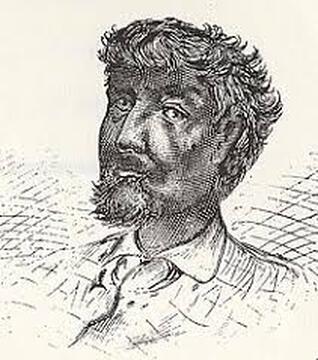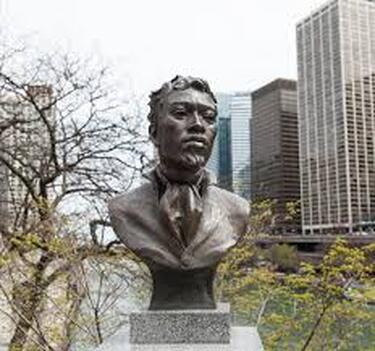|
In a village named St. Marc on the island of Saint Dominique, which is now Haiti, Jean-Baptiste Pointe DuSable was born around the year 1745. DuSable’s mother was an African woman who was formally enslaved and his father was a French sailor; because Dusable’s mother was free at the time of his birth he was born free of enslavement. DuSable would eventually travel throughout the world with his father being educated and even spending a few years learning in France. Gaining his traveling education DuSable learned to speak several languages and dialects including French, English, Spanish, Pidgin languages, and several Indigenous American dialects. Sources suggest that DuSable began traveling with his father because his mother was killed when their boat was raided by the Spanish. In 1765, traveling on his father’s ship from Saint Dominique to New Orleans the ship crashed injuring Du able and causing him to lose his identification papers. DuSable’s injuries were severe and took some time to heal, during his recovery he was almost enslaved because he did not have his identification papers, what saved him was several French Jesuit Priest protected him until his wounds healed. When DuSable’s injuries healed he and a young man named Jean-Baptiste became traders which led them to travel up the Mississippi River settling in what is now Peoria, Illinois, he also settled briefly in Indiana and Michigan. While living in Michigan DuSable married a woman named Kitihawa from the Pottawatomie tribe, the couple produced two children Susanne and Jean. In 1779, DuSable was accused of being a spy, arrested by the British, and imprisoned in Fort Michilimackinac for some time until he was released into the custody of the British Lieutenant Patrick St. Clair. DuSable was forced to manage St. Clair’s woodlands which resided along the St. Clair River in Michigan. Between the late 1770s and the early 1780s, DuSable and his family settled in North East Illinois along Lake Michigan in an area then called Eschikagu, which means “the place of bad smells”. DuSable’s home was built upon eight-hundred acres of land along the North bank of the Chicago River. Using his creativity and resources DuSable established a trading post in Eschikagu which eventually became the most successful trading post in the mid-west. The trading post made DuSable a wealthy man who was able to support his family and buy the finest of items for his home. The name Eschikagu eventually became primarily pronounced as Chicago because of Europeans who could not pronounce Eschikagu correctly. The ongoing American Revolution forced Du Sable and his family off of their lands and stripped them of their rights by the British, he migrated to Michigan where he opened and operated a new trading post. After the conclusion of the American Revolution DuSable was able to reclaim the rights to his land in Chicago and continued to grow his businesses. When DuSable married Kitihawa he was also accepted by the Pottawatomie tribe as one of their own, his great relationship with his wife’s tribe allowed him to hire a few Pottawatomie tribesmen to work for him helping to expand his business. Even though his trading post was thriving, DuSable decided to sell it in the year 1800 to a fellow resident of Chicago named John Kinzie for $1,200. After selling his trading post in Chicago DuSable moved near the Peoria, Illinois area, he owned a farm for ten years, selling it when his wife died. Following the death of his wife DuSable and his daughter moved to St. Charles, Missouri, which was French territory at the time, he was hired by the French governor to operate a ferry on the Missouri River. DuSable faced many financial challenges after moving to Missouri, he could not recreate the wealth he built working his trading post in Chicago. He would lose a lot of money and die in 1818 being finically assisted by his daughter. John Kinzie would eventually take credit for establishing Chicago, a story that would be thought of a fact until the truth about DuSable surfaced. The city of Chicago unofficially recognized DuSable as its founder in 1912, it wasn’t until 2006 that the city of Chicago officially recognized that a black man named Jean-Baptiste Pointe DuSable established their city. A lot of the information about DuSable is either hidden or lost, but we do have enough information to verify his pioneering feats, the second-largest city in America, and the largest trading post in the mid-west was created by a black man, let that sink in. I had the privilege of traveling to Chicago and seeing the monument of DuSable for myself, one of the highlights of my trip. To Jean-Baptiste Pointe DuSable, we proudly stand on your shoulders. J.A. Ward Click the link to learn more about the On the Shoulders of Giants book series!! References:
http://blackhistorynow.com/jean-baptiste-pointe-du-sable/ https://www.blackpast.org/african-american-history/dusable-jean-baptiste-point-1745-1818/ https://www.wbez.org/stories/the-father-of-chicago-jean-baptiste-pointe-dusable/24858f5f-0620-4003-9b84-ac3fe294e1c3 https://en.wikipedia.org/wiki/Jean_Baptiste_Point_du_Sable
0 Comments
Leave a Reply. |
Details
Categories
All
Click Here to join our mailing list
|
Contact Us: |
Connect With Us |
Site powered by PIT Web Design



 RSS Feed
RSS Feed



